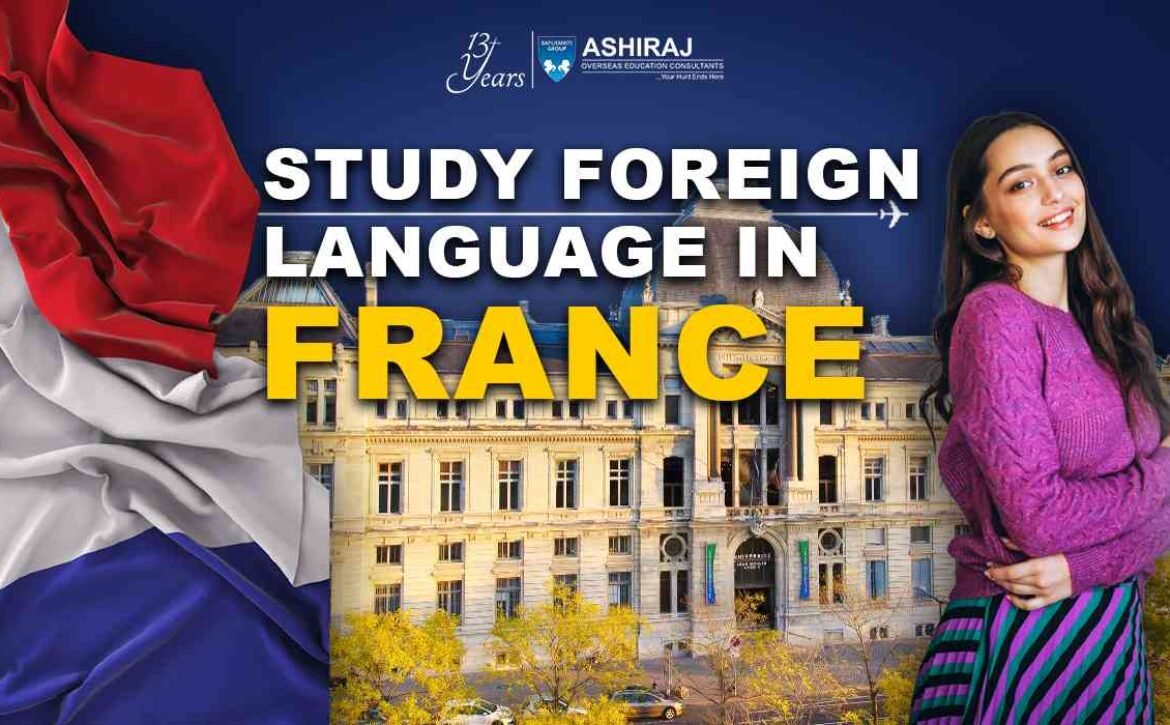
Foreign Language in France
France, a nation renowned for its rich cultural heritage and global influence, embraces foreign languages as an integral part of its identity and connectivity. The pursuit of linguistic proficiency beyond French borders reflects the country’s commitment to international dialogue and cooperation. Foreign Language in France encompasses a multifaceted approach, intertwining history, diplomacy, and education. From the elegant boulevards of Paris to the picturesque villages of Provence, the resonance of languages from around the world permeates the French landscape, enriching its social fabric and economic dynamics. As a bridge between nations, foreign languages serve as catalysts for cultural exchange and mutual understanding, nurturing relationships that transcend geographical boundaries.
In France, the significance of learning foreign languages extends beyond academic realms to encompass diplomatic relations, business endeavors, and cultural exchanges. With a long tradition of linguistic diversity, France embraces the study of foreign languages as a cornerstone of its national identity. Foreign Language in France is not merely a scholastic pursuit but a reflection of the country’s global outlook and commitment to fostering interconnectedness in an increasingly globalized world. Through linguistic proficiency, individuals in France embark on journeys of discovery, forging connections that transcend linguistic and cultural differences, thereby contributing to the vibrant tapestry of the nation’s multicultural landscape.
Why Study Foreign Language in France?
- Cultural Immersion: France offers an unparalleled opportunity to immerse oneself in its rich cultural heritage while learning a foreign language. Being surrounded by native speakers provides an authentic linguistic experience.
- Global Opportunities: Proficiency in a foreign language opens doors to global opportunities, and France serves as a gateway to the French-speaking world, including parts of Africa, Canada, and Switzerland.
- Enhanced Career Prospects: In today’s interconnected world, multilingualism is a valuable asset. Employers often seek candidates with proficiency in foreign languages, especially in industries such as tourism, hospitality, and international business.
- Academic Excellence: France boasts some of the world’s most prestigious language institutes and universities, offering high-quality language programs tailored to students’ needs and interests.
- Cultural Exchange: Studying a foreign language in France facilitates meaningful cultural exchanges, allowing students to gain insights into French customs, traditions, and way of life.
- Personal Growth: Learning a foreign language fosters personal growth by enhancing cognitive abilities, improving communication skills, and fostering empathy and cultural sensitivity.
- Networking Opportunities: Studying a foreign language in France provides ample networking opportunities, enabling students to connect with fellow language learners, professionals, and experts in various fields.
In conclusion, studying a foreign language in France offers a unique blend of cultural immersion, academic excellence, and global opportunities, making it an enriching and rewarding experience for language enthusiasts. Foreign Language in France opens doors to a world of possibilities, both professionally and personally.
Top Universities to Study Foreign Language in France
University | QS World University Ranking 2023 | Type of University | Average Annual Fees | Programs Offered |
Sorbonne University | 25 | Public | €500 – €3,000 | French Language, Linguistics, Translation Studies |
University of Paris | 35 | Public | €300 – €2,500 | French Literature, Language Teaching, Linguistics |
École Normale Supérieure | 40 | Public | €600 – €3,500 | French Studies, Comparative Literature, Humanities |
Sciences Po Paris | 50 | Private | €7,000 – €15,000 | International Relations, Political Science, Law |
University of Strasbourg | 70 | Public | €400 – €2,000 | European Languages, Cross-cultural Communication |
Studying foreign languages in France offers access to world-renowned universities renowned for their language programs and academic excellence. These institutions, listed in the table, provide diverse opportunities for language learners to immerse themselves in French culture and language.
Sorbonne University, ranked 25th globally, is known for its comprehensive programs in French language, linguistics, and translation studies. The University of Paris, ranked 35th, offers a wide array of programs in French literature, language teaching, and linguistics. École Normale Supérieure, ranked 40th, focuses on French studies, comparative literature, and humanities.
Sciences Po Paris, a prestigious private institution ranked 50th, specializes in international relations, political science, and law, while the University of Strasbourg, ranked 70th, provides programs in European languages and cross-cultural communication. With varying fee structures and program offerings, these universities cater to diverse interests and academic aspirations, making them ideal destinations for studying foreign languages in France. Foreign Language in France thrives within these academic institutions, providing students with invaluable linguistic and cultural experiences.
Course Curriculum for Foreign Language in France
- Language Proficiency: Foreign language courses in France emphasize proficiency in speaking, reading, writing, and comprehension skills, enabling students to communicate effectively in real-life situations.
- Cultural Studies: The curriculum often integrates cultural studies, exposing students to the history, literature, arts, and customs of the target language’s country, fostering a deeper understanding of its cultural nuances.
- Grammar and Syntax: Courses typically cover grammar rules, syntax, and vocabulary-building exercises to strengthen students’ grasp of the language’s structure and usage.
- Language Immersion: Many programs incorporate language immersion experiences, such as study abroad programs or language exchange opportunities, allowing students to apply their language skills in authentic contexts.
- Specialized Tracks: Some language programs offer specialized tracks or concentrations, such as business language, medical terminology, or legal language, catering to students with specific career goals or interests.
- Technology Integration: With advancements in technology, many language courses integrate multimedia resources, online platforms, and language learning software to enhance students’ learning experience and engagement.
- Assessment and Certification: Courses often culminate in assessments or certifications, such as language proficiency exams or internationally recognized diplomas, validating students’ language skills and enhancing their employability.
Foreign Language in France courses are designed to provide students with comprehensive linguistic proficiency, cultural awareness, and practical skills, preparing them for diverse personal, academic, and professional opportunities both within France and on the global stage.
Eligibility Criteria & Admission Requirements for MS in Foreign Language in France
- Language Proficiency Tests: Applicants are typically required to demonstrate proficiency in the French language through standardized tests such as IELTS (International English Language Testing System) or TOEFL (Test of English as a Foreign Language). For non-native English speakers, proficiency in English is also often required.
- Academic Qualifications: Prospective students must provide evidence of previous academic achievements, such as transcripts or diplomas, demonstrating their readiness for higher education in France.
- Standardized Tests (Optional): While not always mandatory, some language programs may require applicants to submit scores from standardized tests such as GRE (Graduate Record Examination) or GMAT (Graduate Management Admission Test), especially for advanced or specialized language courses.
- Passport & Student Visa: International students must possess a valid passport and obtain a student visa to study in France. The visa application process typically involves submitting proof of enrollment in a recognized educational institution, financial stability, and medical insurance coverage.
- Academic Certificates: Applicants may need to submit academic certificates or transcripts from previous language courses or related studies to demonstrate their language proficiency and readiness for advanced language learning.
- Work Experience (Optional): Some language programs may consider applicants’ relevant work experience, especially if it pertains to language teaching, translation, or cross-cultural communication.
Test | Minimum Score |
IELTS | 6.5 |
TOEFL | 90 |
GRE | 310 |
GMAT | 600 |
Foreign Language in France programs aim to attract highly qualified and motivated students from diverse backgrounds, ensuring a dynamic and enriching learning environment. Meeting the eligibility criteria outlined above equips students with the necessary skills and credentials to thrive in their language studies and pursue their academic and professional goals in France and beyond.
Documents Required for Studying Foreign Language in France
- Passport: A valid passport is essential for international students applying to study a foreign language in France. It serves as identification and proof of nationality throughout the application process and during the duration of the program.
- Letters of Recommendation (LOR): Applicants typically need to submit two or more letters of recommendation from academic or professional referees who can attest to their character, abilities, and suitability for the language program.
- Statement of Purpose (SOP): An SOP is a crucial component of the application package, outlining the applicant’s motivations, academic interests, career goals, and reasons for choosing to study a foreign language in France.
- Curriculum Vitae (CV): A comprehensive CV detailing the applicant’s educational background, work experience, extracurricular activities, achievements, and relevant skills is required to assess their suitability for the language program.
- Official High School Transcripts and Educational Certificates: Applicants must provide official transcripts and educational certificates from their high school or previous institutions to demonstrate their academic qualifications and eligibility for the language program.
- Work Experience Certificate: If applicable, applicants may need to submit a work experience certificate or letter from previous employers detailing their professional experience and relevant skills.
- Proof of Financial Resources: International students must provide evidence of sufficient financial resources to cover tuition fees, living expenses, and other associated costs while studying in France. This may include bank statements, scholarship letters, or sponsorship documents.
Foreign Language in France programs require a comprehensive set of documents to assess applicants’ academic qualifications, language proficiency, and financial capability. Ensuring the timely submission of these documents is crucial for a smooth application process and successful admission to the desired language program.
Admission Process for Foreign Language in France
- Research and Choose Programs: Explore various language programs offered by universities and language institutes in France. Consider factors such as program duration, curriculum, location, and language proficiency requirements.
- Check Eligibility Criteria: Review the eligibility criteria for each program, including language proficiency tests, academic qualifications, and any additional requirements such as standardized test scores or work experience.
- Gather Required Documents: Collect all necessary documents, including passport, letters of recommendation, statement of purpose, curriculum vitae, official transcripts, educational certificates, work experience certificates, and proof of financial resources.
- Prepare Language Proficiency Tests: Depending on the program’s language requirements, prepare for and take language proficiency tests such as IELTS or TOEFL for English proficiency and DELF/DALF for French proficiency.
- Submit Application: Complete the online application form for your chosen language program and submit all required documents before the application deadline. Ensure accuracy and completeness of the application package to avoid delays or rejection.
- Pay Application Fees: Pay any required application fees as per the university or institute’s guidelines.
- Wait for Admission Decision: After submitting your application, wait for the admission committee to review your application. Admission decisions may take several weeks to months, depending on the program and institution.
- Receive Admission Offer: Upon acceptance, you will receive an official admission offer from the university or language institute. Follow the instructions provided to confirm your acceptance and proceed with the enrollment process.
Foreign Language in France programs follow a structured admission process designed to assess applicants’ language proficiency, academic qualifications, and suitability for the program. Adhering to each step ensures a smooth and successful admission process to pursue language studies in France.
“Education is the most powerful weapon which you can use to change the world.”
Nelson Mandela
Cost of Foreign Language Course in France
- Tuition Fees: Tuition fees for foreign language programs in France vary depending on the institution, program duration, and level of study. On average, tuition fees can range from €500 to €3,000 per year for public universities and language institutes.
- Living Expenses: The cost of living in France, including accommodation, food, transportation, and miscellaneous expenses, varies based on the city and lifestyle. On average, students should budget around €800 to €1,200 per month to cover living expenses.
- Accommodation: Housing options in France include university dormitories, shared apartments, or private rentals. Costs can range from €300 to €800 per month, depending on the location and type of accommodation.
- Health Insurance: International students are required to have health insurance coverage while studying in France. This may be provided through a private insurance plan or the French national health insurance system, with costs averaging around €200 to €500 per year.
- Books and Supplies: Students should budget for textbooks, course materials, and supplies, which can amount to approximately €200 to €500 per year.
Foreign Language in France programs offer a range of financial aid options, including scholarships, grants, and part-time employment opportunities. Prospective students should research available funding opportunities and budget accordingly to ensure a smooth and financially manageable study experience in France.
Scholarships for Foreign Language Courses in France
Scholarship Name | Amount | Application Deadline | Eligibility Criteria |
Eiffel Excellence Scholarship | Full tuition coverage, monthly stipend, and travel allowance | January 9th | Open to international students applying for a master’s or PhD program in France, including foreign language studies. Applicants must demonstrate academic excellence and leadership potential. |
French Government Scholarships | Varies | Varies (typically between January and March) | Available for international students pursuing undergraduate, master’s, or doctoral degrees in French universities, including language programs. Eligibility criteria vary based on the specific scholarship program. |
Campus France Scholarships | Varies | Varies | Offered to international students based on academic merit and financial need. Application deadlines and eligibility criteria depend on the specific scholarship program and funding source. |
Erasmus+ Program | Varies | Varies | Provides financial support for students studying in European countries, including France, through exchange programs. Eligibility criteria and application deadlines are determined by participating universities and institutions. |
Institution-Specific Scholarships | Varies | Varies | Many universities and language institutes in France offer their own scholarships and financial aid packages for international students studying foreign languages. Application deadlines and eligibility criteria vary by institution. |
Foreign Language in France scholarships provide financial assistance to international students pursuing language studies in France. These scholarships cover tuition fees, living expenses, travel costs, and other related expenses, making language education in France more accessible to students worldwide. Applicants should carefully review scholarship requirements, deadlines, and eligibility criteria to maximize their chances of securing funding for their language studies in France.
Career Opportunities After Foreign Language in France
Job Profile | Average Salary (per year) | Description |
Translator/Interpreter | €25,000 – €45,000 | Translates written texts or interprets spoken language between different languages, often in business, legal, or diplomatic settings. |
Language Teacher | €20,000 – €35,000 | Teaches foreign languages to students of various ages and proficiency levels in schools, language institutes, or private tutoring settings. |
International Relations Specialist | €30,000 – €60,000 | Analyzes and manages diplomatic relations between countries, organizations, or corporations, requiring proficiency in multiple languages and cultural understanding. |
Tour Guide | €20,000 – €40,000 | Leads tourists on guided tours of cultural, historical, or scenic attractions, providing information and interpretation in multiple languages. |
Localization Specialist | €35,000 – €60,000 | Adapts products, services, or content for specific linguistic and cultural markets, ensuring accurate translation and cultural relevance. |
Foreign Language in France opens up diverse career opportunities in various sectors, including translation, education, diplomacy, tourism, and localization. Professionals proficient in multiple languages, including French, English, Spanish, and German, are highly sought after in the global job market. Career paths may include becoming a translator or interpreter, facilitating communication between individuals and organizations in different linguistic contexts. Language teachers play a crucial role in educating future generations and promoting cross-cultural understanding. International relations specialists navigate complex diplomatic landscapes, fostering cooperation and dialogue between nations. Tour guides showcase France’s rich cultural heritage to visitors from around the world, while localization specialists ensure that products and services resonate with diverse linguistic and cultural audiences. With competitive salaries and rewarding career prospects, pursuing language studies in France can lead to fulfilling and impactful professional journeys.
Frequently Asked Questions About Foreign Language in France
French institutions offer a wide range of foreign language options, including English, Spanish, German, Italian, and Chinese, among others.
Yes, numerous scholarships and financial aid options are available for international students studying foreign languages in France. Students can explore opportunities such as the Eiffel Excellence Scholarship, French Government Scholarships, and institution-specific grants.
Language proficiency requirements vary depending on the program and institution. Some may require proficiency tests like DELF/DALF for French or IELTS/TOEFL for English proficiency.
Yes, international students are allowed to work part-time while studying in France. However, there are restrictions on the number of hours students can work per week.
The time it takes to become fluent in a foreign language varies depending on factors such as language complexity, student’s aptitude, and immersion opportunities. Generally, it may take several months to several years to achieve fluency.
Yes, many language institutes and universities in France offer language exchange programs where students can practice their language skills with native speakers.
Yes, some programs allow students to study multiple foreign languages simultaneously, although it may require careful planning and dedication.
Yes, many French institutions offer online language courses for international students who cannot attend classes in person.
Yes, international students planning to study in France for more than 90 days need to apply for a student visa.
Graduates of foreign language programs in France can pursue careers as translators, language teachers, international relations specialists, tour guides, and localization experts, among others. The job market values individuals with proficiency in multiple languages.




